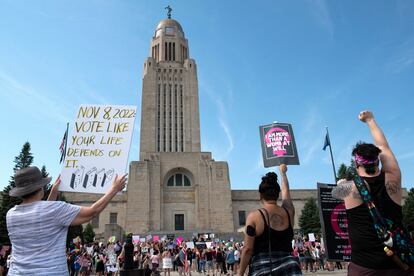US mother charged for helping teen daughter have abortion after Facebook hands over her messages
Mark Zuckerberg’s company turned over personal chats between a mother and daughter, sparking widespread debate about online privacy in the post-Roe era


Jessica Burgess is 41 years old and her daughter, Celeste, is 18. The mother was charged on Wednesday for helping her daughter carry out an illegal abortion when she was 17 years old. The pregnancy was ended at about 23 weeks. In their home state of Nebraska, performing an abortion after 20 weeks is illegal, a restriction that was passed in 2010.
According to the prosecutor handling the case, the mother obtained abortion pills for the daughter and then helped her to bury the fetus. The investigation includes a two-page conversation that the two had on April 20 on Facebook Messenger, in which they discussed the purchase and use of these pills. The case has once again raised debate raised about how the personal information women share online can be used against them when it comes to reproductive rights. This debate came to the fore months ago, even before the US Supreme Court overturned Roe vs Wade, the landmark ruling that established the constitutional right to abortion in 1973.
The investigation into the Burgess began in April, after another woman, an alleged friend of Celeste’s, told police that she had seen the 17-year-old take the first pill, according to an affidavit from Detective Ben McBride of the Norfolk police, which was reported by Spanish news agency EFE. This sparked the probe into the mother and daughter.
In early June, Celeste and Jessica Burgess were charged with a single felony for removing, concealing or abandoning a body, and two misdemeanors: concealing the death of another person and false reporting. Investigators then requested all the mother’s Facebook data since April 15: photographs, audios and videos, private messages and other account information. They wanted to know if she had committed other crimes.
A search warrant was sent and Facebook’s parent company, Meta, searched, collected and delivered the messages. In one of the Facebook messages, Jessica Burgess tells her then 17-year-old daughter gives her instructions on how to take them to end the pregnancy. McBride wrote in his investigation report, “C. Burgess talks about how she can’t wait to get the ‘thing’ out of her body and reaffirms with J. Burgess that they will burn the evidence afterward.”
After reviewing the private Facebook chat, investigators added the felony abortion-related charges against the mother. The two were charged in July and pleaded “not guilty.” Celeste, who has since turned 18, is being prosecuted as an adult, at the request of prosecutors.
Facebook’s response
On Tuesday, Facebook issued a statement arguing that “much of the reporting about Meta’s role in a criminal case against a mother and daughter in Nebraska is plain wrong.”
It explained: “We received valid legal warrants from local law enforcement on June 7, before the Supreme Court’s decision in Dobbs v. Jackson Women’s Health Organization. The warrants did not mention abortion at all. Court documents indicate that police were at that time investigating the alleged illegal burning and burial of a stillborn infant. The warrants were accompanied by non-disclosure orders, which prevented us from sharing information about them. The orders have now been lifted.”
The case has sparked outrage online, with the hashtag Delete Facebook quickly going viral. “A lot of people are missing the point here. Regardless of what is in those messages, they thought she had an abortion. They subpoenaed Facebook – who cooperated without any pushback – to find out more information. This precedent is dangerous. This will put people at risk,” wrote Olivia Julianna, an activist and member of the NGO Gen-Z for Change, who posted“every woman should delete Facebook right now. #DeleteFacebook.”
Concern over how women’s online data can be used against them has been growing for months. When the Supreme Court struck down Roe v. Wade, American women began to fear that data from period tracking apps could be potentially used to penalize anyone considering an abortion.
Under the US Health Insurance Portability and Accountability Act (HIPAA), aborting clinics and healthcare providers are not allowed to reveal to law enforcement whether a person has had an abortion. This rule also applies to medical insurance companies. However, neither the firms that save data nor cellphone applications are subject to it. So all the information can become evidence of an illegal abortion, depending on the legislation of each state.
Indeed, the European Union has been negotiating for years for an agreement that would exempt European citizens in the US’s lax data protection system. In other words, Brussels wants to make sure that the CIA or the FBI cannot access information stored by Google on European citizens.
Tu suscripción se está usando en otro dispositivo
¿Quieres añadir otro usuario a tu suscripción?
Si continúas leyendo en este dispositivo, no se podrá leer en el otro.
FlechaTu suscripción se está usando en otro dispositivo y solo puedes acceder a EL PAÍS desde un dispositivo a la vez.
Si quieres compartir tu cuenta, cambia tu suscripción a la modalidad Premium, así podrás añadir otro usuario. Cada uno accederá con su propia cuenta de email, lo que os permitirá personalizar vuestra experiencia en EL PAÍS.
¿Tienes una suscripción de empresa? Accede aquí para contratar más cuentas.
En el caso de no saber quién está usando tu cuenta, te recomendamos cambiar tu contraseña aquí.
Si decides continuar compartiendo tu cuenta, este mensaje se mostrará en tu dispositivo y en el de la otra persona que está usando tu cuenta de forma indefinida, afectando a tu experiencia de lectura. Puedes consultar aquí los términos y condiciones de la suscripción digital.








































